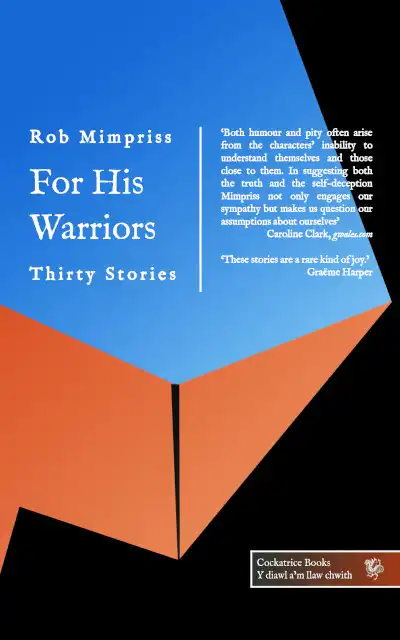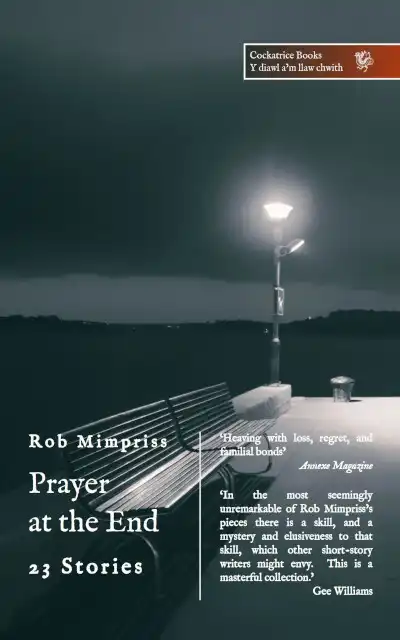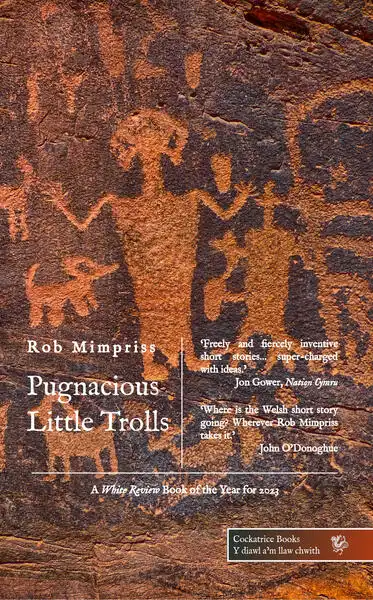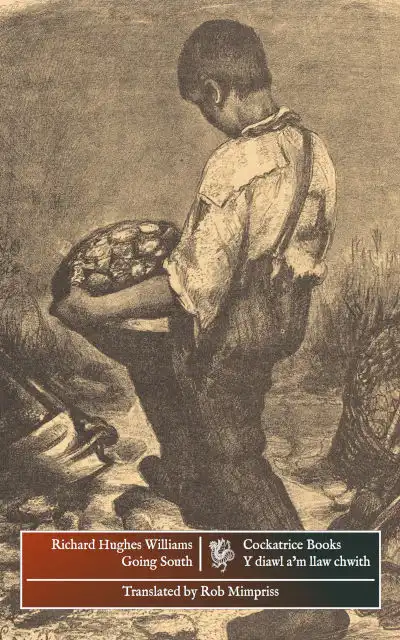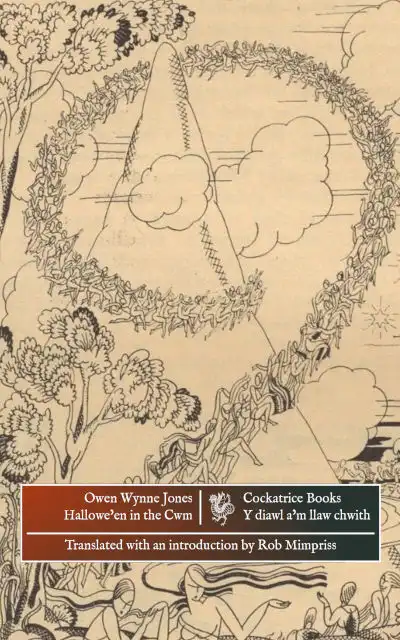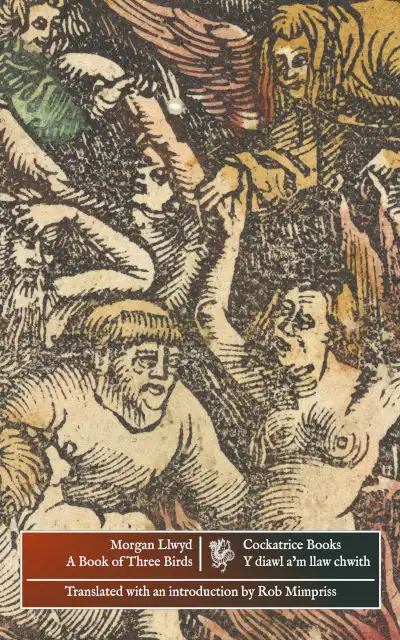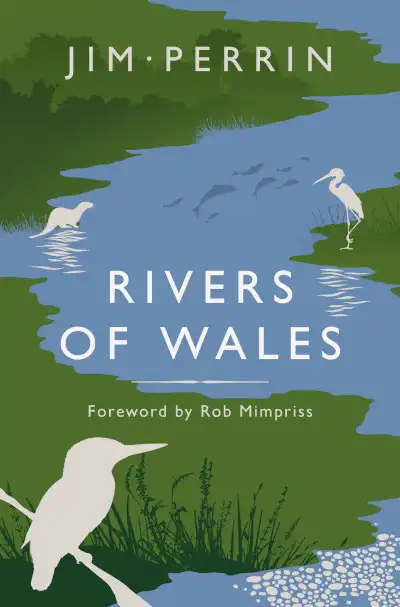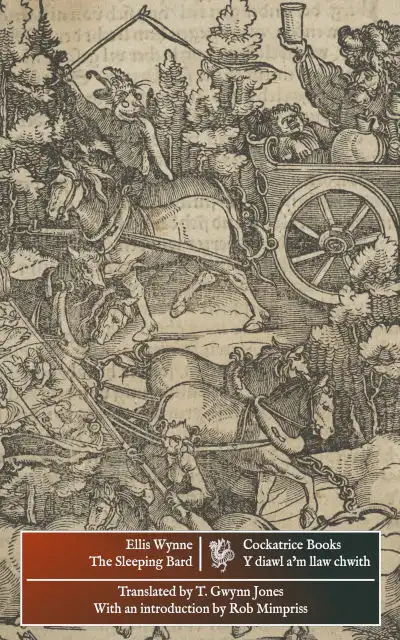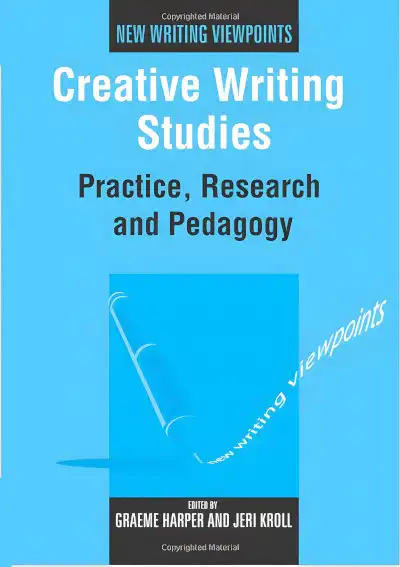William John Griffith (1875-1931) was the author of a single volume of short stories, Storïau’r Henllys Fawr, published posthumously in 1938, and adapted for television in 1983. Set in rural Anglesey, where he lived his life, the stories concentrate on an unnamed narrator, the farmer of Henllys Fawr, and the comic misadventures of his friend, Williams, who sees himself as a cosmopolitan and innovator in a typically sleepy Welsh parish. The story below shows Griffith’s technique to particular advantage, with its irony and humour, its focus and pace, its use of atmosphere and setting, and its array of skilfully sketched minor characters.
‘Tin Lizzie’ translates the term ‘Hen Siandri,’ and appears apt because a car, normally masculine in Welsh, is feminised as temperamental and flighty, much like Williams’s wife, the unseen ‘missus.’ While women are realistically portrayed in the novels of Daniel Owen (1836-1895), and come to the fore in the short stories of Kate Roberts (1891-1985), one might most charitably suggest that they are sidelined in Griffith’s fiction much like adults are in the fiction of E. Nesbitt, and to similar effect. This translation from the Welsh of W. J. Griffith is my own.
One night, within about three weeks of Christmas, my friend Williams called on me.
‘I’m in a bit of a rush,’ he said, pulling a newspaper from his pocket. ‘Read that.’ And he put his finger over a spot he had circled in the advertisements.
The advertisement made plain that a man in town was offering a bargain on a second-hand motorcar.
‘Oh,’ I said, ‘you’re thinking of buying a motorcar, are you?’
‘That’s the idea,’ he said. ‘A businessman has to move with the times, or he might as well shut up shop.’
I assented to the assertion. Williams sat down, pulling on his pipe.
‘And another thing,’ he continued, ‘you’re no one in society if you don’t have a motorcar. I felt quite snubbed on the way tonight – Huws the Insurance and his wife and daughter zoomed past with their noses in the air. Anyone would think walking was some terrible sin, and using horse and cart was even worse. Tell me, can you think of anyone who takes a gig to the market these days, except you and me and Tomos the Salt?’
‘Well, no. Not as far as I know.’
‘No one does, old boy. Every Tom, Dick and Harry roars past in a motorcar, whether it’s a charabanc or one of those little tubs with a place on the back for the footman.’
Williams pulled hard on his pipe.
‘I’ve come to this, you see. I have to get a motorcar, or put the shutters up.’
‘How so?’ I asked.
‘The missus has kicked over the traces,’ he replied, lowering his voice as though the missus were just outside the door. ‘All respect to the missus, of course. I wouldn’t say a word against her, except to you. But you know, if she sees a new hat in the chapel on Sunday morning, she’ll fling it in your teeth over dinner. And what I’ve had to swallow with every meal I sat down to these past few weeks is Huws the Insurance and his motorcar. I’ve started to hate the man, and as you know, he’s the most harmless little fellow who ever dealt in life insurance. I can take a little bit of sauce with my meals, but when your wife wakes you up in the dead of night to give you an earful for not buying her a motorcar, well... it’s time to put your foot down.’
Williams got to his feet, and knocked his pipe furiously against the grate.
‘And so,’ he said, ‘I want you to come with me to town tomorrow to have a look at this contraption. I know it’ll do for me to learn to drive on, and it’ll keep the missus quiet for a bit.’
I knew from experience what misfortunes followed my friend’s adventures, and tried to excuse myself.
‘Wouldn’t you be better off taking Morris the Motor?’ I asked. ‘He understands motorcars.’
‘So he claims. No, I’d rather have a friend who knows nothing about it than a man who knows everything.’
I pleaded the pressure of work on the farm, but it made no difference.
‘The first train tomorrow morning, remember,’ he said as he left.
And so, at about ten o’clock the next morning, Williams and I could be seen in an out-of-the-way yard in the outskirts of the town, casting a critical eye over a motorcar whose every inch bore the heavy ravages of time.
The owner stood nearby, barely dressed, as though we had come upon him before he had woken up.
‘Oho,’ said Williams, ‘so this is the old banger, is it?’ And he began a careful inspection in the manner of a drover looking over a horse. He walked round the car, lifted the bonnet to discover its age, as it were, and drew his fingers over every part of its body that was in reach, and all the while passing unfavourable judgement on everything he touched. Terms of the trade tripped off his tongue, and it was clear that the owner was developing the highest opinion of his mechanical knowledge. However, I doubted that my friend could have given a board of examiners a satisfactory account of the difference between a carburettor and a cabbage. We got the Tin Lizzie started, and realised at once that its strong points were noise and smell, and that it was generous with the exhaust, but extremely reluctant to change gear.
‘Is it worth forty quid?’ whispered Williams in my ear.
‘More or less,’ I replied, reluctant to commit myself either way.
‘So then,’ he said to the seller, after we had disembarked, ‘to get to the point, how much do you want for this old banger?’
‘Well,’ replied the seller, with a defiant note in his voice, ‘I’m asking thirty shillings for it.’
‘What?’ said Williams, straightening up and staring at the man as though he were growing horns. I was also shaking. The seller misunderstood our surprise.
‘I mean to say,’ he explained hastily, ‘that I won’t take less than twenty-five.’
Williams looked back and forth from him to me, and then drew me to one side.
‘Pinch me,’ he said.
‘What for?’
‘I want to know if I’m dead or dreaming. Did you ever hear in your life of a motorcar going for twenty-five shillings?’
‘No, Williams, never.’
‘Well, man alive, you won’t get a wheelbarrow for less than a quid. How do we know this isn’t some trick? I don’t like the look of that fellow. For all we know, he stole it.’
‘Or he’s taken leave of his senses,’ I said.
Williams beckoned a boy who was kicking his heels nearby.
‘Does that man own that motorcar?’
‘So they say,’ replied the boy.
‘Is he all right in the head?’ asked Williams.
‘Far as I know,’ replied the boy. ‘If he isn’t, it’s on account of the beer he drank last night.’
‘Oh, does he...?’ And Williams held an imaginary bottle to his lips.
The boy gave a wink and turned on his heel.
‘That puts some light on the problem,’ said Williams. ‘It’s end of term for this old fellow, and his pockets are empty. Well, I’ll hold him to his offer. The old rust bucket will do for me to learn to drive in, anyway.’
And he went over to the man and closed the bargain at once. It was agreed that the boy would deliver the Tin Lizzie the following night, since he could not be spared the same day, and that Williams would pay him according to the strictest requirements of the union.
Before leaving town, Williams bought a number of items that were indispensable for the successful motorist, among them a handbook for learning the craft, a great coat with a strap round the middle, and a pair of buffed leather gloves. He also advised me in confidence that the missus herself was minded to equip herself for the motoring life by purchasing a fur coat.
It was more than a week before I saw my friend Williams again, but I happened to be in the village the evening before the Christmas market, and called at the shop. Williams was filled with enthusiasm. He gave me to understand that he was gradually blooming as an excellent driver, that he had already mastered the theoretical principles from the book, and had benefited further from the practical instruction provided by Morris the Motor.
‘I’ve set my heart on taking the plunge tomorrow,’ he said. ‘I’ve got my licence, and I’d like you to come with me for a drive into town.’
I inwardly cursed the cruel fate that had guided my steps to the shop that evening. I made a weak attempt to pull out. ‘Won’t I be taking the place of the missus?’ I asked.
‘The missus won’t risk it until I’m more at home behind the wheel.’ Williams dropped his voice. ‘And confidentially, old chap, that’s fine by me. There’s nothing worse for a fellow’s nerves than a woman beside him getting into hysterics at the slightest thing... Oh, must you go? Well, good night. I’ll be at the end of the lane by nine. Don’t keep me waiting. The engine gets cold very quickly, you see.’
I considered nine o’clock rather early to start out, but I was in good time at the end of the lane. There was no sign of my friend anywhere, and I half hoped that he had broken down at the start of the drive, but in less than ten minutes I could hear the Tin Lizzie’s cylinders firing, and presently it came into view round a turn in the road, moving at a slow but steady pace. I saw Williams opening the door on the left hand side before she reached me.
‘Jump in,’ he said. ‘I’d rather not stop; she’s a bit touchy on starting.’
I sat down and made myself comfortable.
‘Well,’ said Williams, ‘what do you think of the get-out?’
The first thought that came to mind was that going by his outfit, my friend owned a Rolls Royce, and going by its speed, he was driving a steam-roller.
‘Can’t this contraption go any faster, Williams?’ I asked. ‘I’d like to reach town before the market is over.’
‘Don’t give it a moment’s thought,’ said Williams. ‘I’ll make sure you’re there in good time, but I have to be careful at the start, you know. The book says you shouldn’t attempt the second gear until you’re completely confident in the first. She kicks like the devil as well, you know, when you put her in second gear.’
‘Oh, well,’ I said, sitting back and trying to make the best of the situation.
Williams offered a lift to a pedestrian who went past us, but he turned down the offer on the grounds of haste. After this I sat further back. Fortunately the road was broad and clear of traffic, and we saw only a few human beings. However those few showed us particular interest, from the boy who went past on a bicycle and offered to inform our families that we were on the road, to the man who stepped aside into the verge to make way for us, under the impression that we were following a hearse. I felt every one of these encounters strike home, but my friend was too absorbed in his machine to take the slightest notice of them. After declaiming briefly on the two habitual sins of the Welsh countryman, namely surliness and mean-spiritedness, he got on with listing the different parts of the engine to me, along with their functions. He had clearly paid meticulous attention to the handbook, but I would have preferred it if had shown a little more awareness of the practicalities. He was in the middle of explaining the principle of internal combustion when the Tin Lizzie skidded into a duckpond on the side of the road. By luck Williams kept his head, and with skilful use of his hands and feet, he plucked us up from the threshold of a watery grave.
We proceeded for some quarter of an hour down a length of post road, and during that brief period we became a public sensation. Of the multitude that passed us, going this way and that in their motorcars, not one failed to greet us in word or gesture.
‘Don’t take any notice of them,’ said Williams, and proceeded to comment on the advantages of travelling at slow speed. It was an opportunity to meditate at one’s leisure and to study nature in her beauty and mystery. I told him I doubted that nature had anything on the road that morning more mysterious than the Tin Lizzie and ourselves.
We had a choice of two roads that branched from the post road towards the town, and I persuaded Williams to take the first and quieter of the two. I had tired of the post road, though later I repented. If I had chosen the second, perhaps we would not have caused so much commotion as we did on our entry into town. The narrow street, wide enough to admit only one lane of traffic, led from the road to the centre of town. By the time we had reached the end of the street, it was almost mid day, and cars coming to town for the market were beginning to queue up behind us. Right on our heels were a fat lady and a boy with a load of plucked geese. Immediately behind them were an old farmer and his wife in an old-fashioned gig, and they in turn were being followed by a long line of vehicles of every description. With his head sticking out of one of them, a red-faced Englishman demanded that someone wake up the fool in front, and I understood from what the fat lady was saying that she was already late for the market, that my friend Williams would pay a terrible penalty for every goose that went unsold, and that she would not think twice before telling Wil, the boy, to run us over.
‘Take no notice of them,’ said Williams. ‘We have as much right to use the road as anyone.’
‘Well, try to put a bit of life in this old thing, for goodness sake,’ I begged him. I was sure the Tin Lizzie had slowed down, and was on the verge of stalling. ‘We’re holding up the traffic.’
‘Never mind, old boy,’ said Williams, applying his foot to the accelerator. ‘A few minutes in traffic like this is better practice for me than a week with Morris the Motor.’
Just then I noticed two men standing on the pavement deep in conversation, and oblivious to us until we were parallel to them. As soon as their eyes fell on us, and on the line of traffic behind us, they doffed their hats with expressions of profound respect.
‘What the devil are those fools playing at?’ asked Williams.
‘They think we’re a funeral procession,’ I told him.
I was on the point of getting out of the car to finish the journey on foot when I saw a policeman coming briskly from the direction of the square.
He stopped within a few yards of us, cast an official eye up the queue of traffic, and stepped forward towards us.
‘Now, now,’ he said to Williams, ‘what’s all this about?’
‘What’s the matter, officer?’ asked Williams. ‘I’m keeping within the speed limit: ten miles an hour, isn’t it?’
‘Ten miles an hour?’ said the policeman in astonishment, walking slowly beside us. ‘If you do ten miles this week, I’ll eat my helmet. Now give it some gas; you’re blocking the traffic.’
Williams turned to me.
‘Well, in all your life,’ he said, ‘did you ever hear of a man getting a ticking off for driving under the speed limit?’
And at that moment, as though in protest, the engine died and the Tin Lizzie ground to a halt.
I heard a sudden clamour behind us, the farmer shouting ‘Whoah! Back!’ to his horse, the motorists braking, and the fat lady and the red-faced Englishman heaping maledictions on our eternal souls.
‘Damn it, what’s wrong now?’ said Williams, and got down to give the crank a turn. But in vain; the Tin Lizzie showed not a sign of life. He pulled off first his gloves, and then his great coat, and started working the crank in earnest. Meanwhile the policeman was trying to push back the load of geese so he could see the Tin Lizzie’s number, while the fat lady and the red-faced Englishman made use of the opportunity to curse my friend Williams in two languages, and others have him stern counsel on the subject of keeping pace.
Presently one of the motorists came forward. He lifted the bonnet, ran his fingers disdainfully over the engine, glanced inside the front of the car, and shook his head.
‘Look here,’ he told Williams. ‘You’re not going to get anywhere turning the handle like that. You’re out of petrol.’
Williams sighed, and wiped the sweat from his brow.
‘Well, kick me!’ he said. ‘And I knew the old girl is fond of a drink.’
Willing hands gave the Tin Lizzie a push off the road, and the traffic cleared itself.
‘I wouldn’t go through that again if you paid me,’ said Williams. ‘But now go and do your errands, and I’ll see you in the market later. I have to go and get petrol once I’ve sorted out this policeman.’
We did not stay long in the town, because we wanted to get home before dark. However, we took the chance to make peace with the fat lady in the market by buying a brace of her geese.
We left the town with less commotion than we had entered, and I fervently hoped that the journey home would be as peaceful. For a while we drove without incident, except that the other road users behaved like idiots, but once we had left the highway a mile or more behind us, fate gave us another shaking.
‘Hello, what’s that?’ said Williams, just after we had turned a sudden corner in the road.
‘That’ was an old man driving a brood sow ahead of him, with five feet of rope knotted round its rear fetlock.
‘I’d rather not pass pigs on the road,’ said Williams. ‘You never know where they’ll go. They’re more skittish than women.’
And indeed the sow, having heard the sound of the motor, was already becoming restive, and her drover had thrust his pipe in his pocket and was plucking on the rope.
‘We’ll never get past them at this speed,’ said Williams. ‘I’ve half a mind to put her in second gear, and overtake them in a spurt... Hold tight,’ he said suddenly, putting his foot down on the pedal and pulling the gear lever, and at once, with a crunch of gears and a kick, the Tin Lizzie leapt forward, and with a snort the sow broke into a gallop.
‘Well, now we go for it,’ said Williams, clutching the wheel. ‘Neck or nothing!’
‘Hey, you devils!’ roared the old man over his shoulder. ‘Stop that tin can!’
But we were almost level with them by then, and it was obvious that the poor sow had decided that the devil in his fiery chariot was on her heels. She gave a despairing squeal and leaped suddenly across the road, and it is Providence alone to thank that she was not reduced to bacon there and then.
‘Have I killed her, do you know?’ asked Williams, stopping the engine. But the sow was galloping wildly back the way she had come, and the old man, who by luck had let go of the rope, was sitting on the edge of the ditch, apparently still alive. The force of his eloquence was remarkable in a man his age.
‘Don’t listen to him,’ said Williams, furiously letting go of the clutch. ‘An old man his age shouldn’t be driving animals on the public highway. He should be sitting at home by the fireside, contemplating his mortality.’
I thought by now the old boy had as much insight into his mortality as could be asked of anyone.
A little after this we had to turn on the headlamps, and we were some way distant from the town. The light was dim, but the moon in her splendour was smiling down at us from a firmament thick with stars. Gradually a silence crept between us as we fell without noticing under the spell of the moon. It whispered to me of youthfulness and vigour, beauty and romance. My thoughts flew down the years to the time of my youth, and I remembered that old nursery rhyme: the full moon, little children playing, the bandits coming in knitted socks... Then I remembered the love poem by Eifion Wyn, ‘the moon as a witness to our pledge...’
‘Would you like some herring?’ asked Williams suddenly. ‘I bought some in town.’ I realised with disappointment that my friend was still thinking about material things. I tried to draw him into my own enchanted world through the medium of poetry, and was successful to a degree.
‘Walking a hayfield, I met my sweetheart,
And in the moonlight I gazed on her beauty,’
I said.
‘Jolly good,’ said Williams. ‘I must tell that one to the missus when I get home tonight. A bit of sentiment between a man and his wife keeps things flowng smoothly.’
Since I knew that the missus was suspicious by nature, and liable to misconstrue the relevance of the lines, I begged Williams to make use of another more impersonal couplet:
‘For a while, from its white court,
The distant moon rules the world,’
I recited.
‘That’s rather pretty,’ he said. ‘Say it again.’ And he tilted his head to listen.
‘Why don’t you look where you’re going, you fools?’ cried an angry voice from the direction of the radiator, and with that the Tin Lizzie collided with a telegraph pole. We saw two men taking to their heels, one of them, the owner of the voice, snarling at us angrily. Neither of us was more than shaken, but the Tin Lizzie was badly damaged.
‘Well,’ said Williams, watching aghast as water spurted from the radiator, ‘that’s the end of that.’ I doubted there could have been a better summary of the situation.
‘Well, then, what do we do with her?’ he continued. ‘I can’t leave her by the roadside, or Jones the policeman will have her towed away. Do you think you could lend me a horse to pull her home?’
‘With pleasure,’ I replied. And home I went at once to fetch the lad and the old mare. We were not far from the road that led to the house.
Old Lofty was harnessed, and the lad got on her back to lead. Williams took his place at the wheel, and since I wanted to keep an eye on things, I took my place at his side. The old mare drew us quite quiet and steady, except for one incident descending a hillside.
‘Give us a bit of slack on the way down the hill, lad,’ said Williams.
‘All right, Mr Williams. Whoah! Back!’ cried the lad.
Unfortunately, he gave us so much slack that the engine nudged Lofty’s heels, and in protest she gave the radiator a kick. But as Williams said, it was out of working order anyway.
Two boys were leaning against a wall at the outskirts of the village, and going by their bearing, they had long grown tired of village life. However, the moment their eyes rested upon us, their joy was restored. One half turned, and placing his fingers between his teeth, gave a shrill whistle. The other turned on his heel and ran up the road, shouting at the top of his voice:
‘Hey, boys! The circus!’
‘Williams,’ I said, with my foot on the step of the car, ‘I have to see Robert Roberts the builder for a minute. I’ll see you later.’
And before my friend had realised what I was planning, I had slipped away and lost myself in the crowd flooding pell mell down the road.
At first the general opinion was that the circus was coming, and had sent one of their acts ahead of them to advertise the fact. But little by little people realised that this was merely my friend Williams being towed home from an accident by the lad and old Lofty. The realisation did not reduce their interest a whit, and I doubt that anyone came home from the Christmas market in such a triumphal procession to his door.
There was only one dissenter I saw, and that, as one might expect, was Jôs the policeman. He paced beside the Tin Lizzie with a harrassed expression, as though unable to decide which law the malefactor had broken.
The following week I read the advertisement below in the local paper:
‘Second-hand motorcar. To sell cheap or exchange for a gramophone. Enquire of Williams, Williams’ Stores, Llanaraf.’

